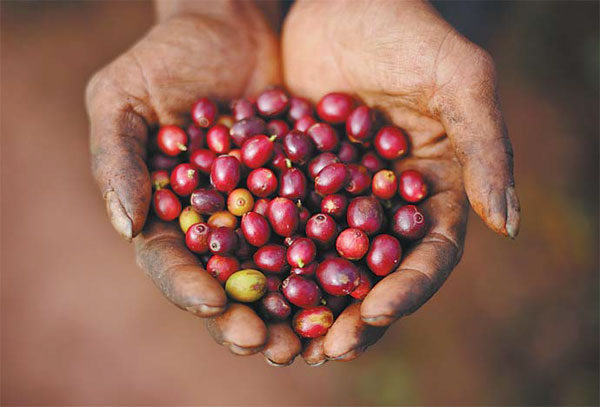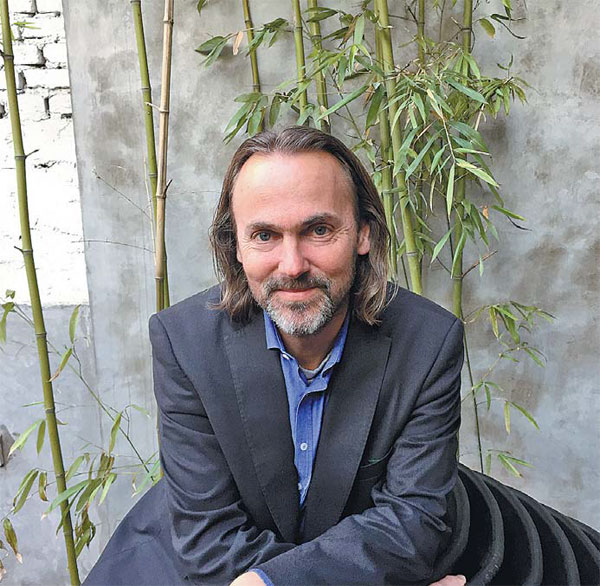Appetite grows for sustainably farmed food
Updated: 2015-06-05 06:06
By Chen Yingqun(China Daily Europe)
|
|||||||||||
Consumers push companies to use consistent international standards
Evert Raymakers visited China and learned Mandarin more than 20 years ago. Unlike other businesspeople, who have reaped the rewards of China's economic boom, he has worked in the country for only a few years.
Raymakers, market development manager at UTZ Certified, says China's growing awareness of sustainability brought the company to the Middle Kingdom in 2013.
|
Since Starbucks entered Yunnan, it has been encouraging its local suppliers to follow CAFE practices. Provided to China Daily |
|
Evert Raymakers says products made by a company that cares about sustainable agricultural development and social responsibility are more appealing to consumers. Chen Yingqun / China Daily |
UTZ Certified, which is based in Amsterdam, helps to develop sustainable agricultural supply chains. It also offers certification programs and provides international standards for sustainable farming.
"Five years ago, when I came to China, there was hardly any discussion about sustainability," he says. "In the past few years, some of our clients have experienced more demand so we decided to come here."
China is the world's largest producer and consumer of many crops, according to the International Institute for Environment and Development, and its agriculture also has a global impact.
The country's use of fertilizers and pesticides are among the highest in the world, says IIED. Soil erosion, soil pollution and loss of agricultural biodiversity are widespread and water scarcity affects many parts of the country.
The benefits of sustainable farming - practices and methods that are profitable, ecologically sound and good for communities - include improvements to the environment and public health.
Food scandals, in which products such as milk, meat and soft drinks have been contaminated and even killed people, have also prompted Chinese consumers to attach greater importance to how their food is made.
Furthermore, the Communist Party of China Central Committee's No 1 Central Document for 2015, which outlines policy priorities for the year and is an annual publication, emphasizes food security, sustainable agriculture and the environment. It also talks of rural agriculture reform and says there should be a balanced emphasis on quality and quantity, instead of pursuing high output at the cost of resource depletion.
A Xinhua report, published in March, says China feeds more than a fifth of the world's population on only 10 percent of arable land worldwide. Its grain output grew 0.9 percent year-on-year to 607.1 million tons in 2014, marking 11 consecutive years of growth.
"In many parts of the world, particularly in Western economies, companies have a very strong focus on sustainability, as well as on corporate social responsibility," says Raymakers.
"More brands need to prove their products are made in a sustainable way in their countries of origin, and that their products can be followed from one point in the supply chain to another.
"It means that products made by Chinese suppliers for other countries need to be in line with international requirements. It is not forced by UTZ, it is driven by market trends."
Raymakers says products made by a company that cares about sustainable agricultural development and social responsibility are more appealing to consumers.
Companies can also strengthen their own capacity to resist weaknesses in the supply chain.
"We all need to eat, for which we need agriculture. But if we want to ensure that we can also eat in 50 years time, then we will have to start to change our agricultural methods now."
International brands buy products and commodities from all over the world, so every producer and farmer needs to prove that their way of production is sustainable, which makes an international standard important.
"Because if they have to work with national standards and certifications in every country they are active in, it will give them a huge headache, because then they have to do that in Indonesia, India, Africa, South America, everywhere," he says.
UTZ helps companies in the supply chain to follow international standards, so brands know the products have been produced in a sustainable way.
The company says most of its clients are international companies such as Ikea, Mars and Nestle.
In 2014, 729,918 tons of coffee, 879,771 tons of cocoa, 72,346 tons of tea and 2.1 million tons of palm oil sold around the world were certificated by UTZ.
As of 2014, UTZ Certified is the largest program for sustainable coffee and cocoa farming in the world.
"Suitable agricultural development means we can continue with the current agricultural production situation, and also satisfy demand in the future, which means respecting the environment, workers and their families," says Raymakers. "The whole supply chain - processing, trading, packaging and consumers - is part of sustainable ecological communities."
As China continues to experience economic transformation, sustainability has become a national priority.
The Ministry of Agriculture has issued the National Agricultural Sustainable Development Plan (2015-2030), which encourages the country to achieve sustainability in five areas in the next 15 years: development layout, cultivated land protection, more efficient use of water, environment protection and restoring agricultural ecology.
Raymakers says organic farming is expensive in China, even though there is a bigger appetite for food grown without chemicals.
"So we focus on how to use agrochemicals, such as fertilizer and pesticide, in a responsible way. We believe that safe and responsible agriculture should be available for every Chinese consumer."
He says that Chinese companies can benefit from learning about international standards because China's economy is becoming more intertwined with the West's. But sustainability is about consumer behavior as well as company behavior. "We hope China will be able to educate people on how they can be more responsible for water resources," he says.
Raymakers, who was in China between 1997 and 2000, says the country still needs to pay more attention to its environment than it has done in the past three decades. Sustainable agriculture, amid environmental degradation, will become increasingly important.
UTZ is working with tea and coffee organizations in China. Li Gongqin, secretary general of the Coffee Association of Yunnan, says farmers are receiving more training and that working with UTZ will help them with profits and standards. He also says there are other coffee certification programs, such as 4C. Nestle launched this program in 2012 - Common Code for the Coffee Community - for coffee farmers and coffee company staff. The 4C label, created in Germany in 2003, ensures fair production while preventing soil exhaustion and pollution. Only natural pesticides are allowed, child labor is banned and recycling and biodiversity are encouraged.
In 2014 Nestle announced that it would only purchase coffee beans that have passed 4C verification in Yunnan.
Beverage giant Starbucks has its own program, Coffee and Farmer Equity, which has guidelines in quality, economic accountability and transparency, social responsibility and environmental leadership.
Since Starbucks entered Yunnan, it has been encouraging its local suppliers to follow CAFE practices. The company publicly stated in 2008 that it hoped to source 100 percent of its coffee through CAFE, Fairtrade or another externally audited system by 2015.
In 2014, 96 percent of its coffee met this standard, with 95.5 percent through CAFE and 8.6 percent through Fairtrade.
chenyingqun@chinadaily.com.cn
(China Daily European Weekly 06/05/2015 page30)
Today's Top News
65 bodies found, more than 370 still missing
Ex-FIFA executive detailed bribes in 2013 secret guilty plea
Beijing 'shocked' at Nazi comparison by Philippines
Ship disaster in Yangtze River: Roundup of updates
HK economy will suffer if reform fails, tycoon says
Blatter rocks world soccer by quitting FIFA amid scandal
Obama signs bill remaking NSA phone records program
China's Dalian Wanda buys Australian cinema chain Hoyts
Hot Topics
Lunar probe , China growth forecasts, Emission rules get tougher, China seen through 'colored lens', International board,
Editor's Picks

|

|

|

|

|

|








